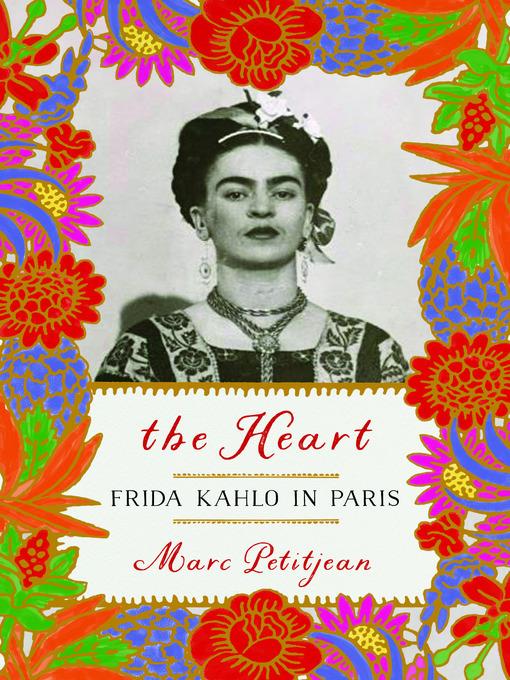
The Heart
Frida Kahlo in Paris
کتاب های مرتبط
- اطلاعات
- نقد و بررسی
- دیدگاه کاربران
نقد و بررسی

December 23, 2019
Documentary filmmaker Petitjean examines the little-known story of Frida Kahlo’s time in pre-WWII France and her whirlwind romance with his father, Michel Petitjean, in this captivating biography. Preparing to leave Mexico in 1938 for her first solo exhibition in New York, Kahlo discovered that her husband, painter Diego Rivera, was having an affair and intended to divorce her. Seeking consolation, Kahlo sailed to France in early 1939 at the invitation of surrealist Andre Breton, who had recognized her talent during a 1938 visit to Mexico. While in Paris, Kahlo socialized with Pablo Picasso, Man Ray, Marcel Duchamp, and Elsa Schiaparelli; celebrated the exhibition of her work with other Mexican art at the Pierre Colle Gallery; and enjoyed a passionate affair with art journalist Michel Petitjean, before giving him her self-portrait of heartbreak called The Heart, “so you don’t forget me.” What emerges is a perceptive portrait of an artist finding herself and learning to love and paint again. Fans of Kahlo’s art and of the surrealist movement will want to give this thoughtful and illuminating work a look. (Apr.)Correction: An earlier version of this review misspelled the author's last name.

February 1, 2020
A breezy bit of art history about a 1939 affair between the author's father and Frida Kahlo in Paris. Combining both research and conjecture, photographer and documentary filmmaker Petitjean attempts to retrace the circumstances of this underdocumented romance. Frida visited Paris in 1939; she left an adulterous Diego Rivera back in Mexico and found herself on an emotional threshold before her European debut in André Breton's exhibition of Mexican art. While Breton and other surrealists fetishized her foreignness, Michel Petitjean, the author's father and local gallerist, saw beyond that surface impression. Michel and Frida had a short affair, during which she gave him a small painting called The Heart, which was a fitting token for the man who, for once, saw all of her. The painting, writes the author is "a concentration of the key characteristics in [her] art and her biography: intimacy, identity, physical and psychological suffering, references to Mexican culture, and references to art history." While the story is transportive and dreamy, the author's awkward sequencing of facts and loose creative license muddle the scholarly authority. For example, Petitjean doesn't explain until near the end of the narrative that his father studied Mexican civilizations at the Museum of Ethnography. Stylistically, he often embellishes: He remarks on the subtle implications of Breton's "tone of voice" and, elsewhere, imagines mental pictures in his father's mind. He also writes that, one morning during a pain spell, Frida "contemplates each of her organs in turn." Petitjean is undeterred by a lack of concrete sources: "I do not have any information to know for sure...but by cross-checking the whereabouts, circumstances, and personalities of the protagonists I will attempt to reconstruct the scene." While prefacing another tangent, he writes, "I imagine, but I may be wrong." While his heart's in the right place, the author's penchant for stylized prose often overwhelms the book's more academic qualities. A lightly investigative biography about a painting's provenance and its hidden romantic history.
COPYRIGHT(2020) Kirkus Reviews, ALL RIGHTS RESERVED.

February 1, 2020
While writer and documentary filmmaker Petitjean was growing up in Paris, a disturbing painting by Frida Kahlo hung on a wall in his childhood home. The Heart is a self-portrait in which the artist has no hands; a large hole in her chest is pierced by a golden rod; and an enormous human heart bleeds onto the ground. Spurred by a query from a Mexican writer about an affair between Petitjean's father, Michel, and Kahlo, when she was in Paris in 1939, the author investigated. He now introduces his colorful father, Michel, as an ethnographer, agronomist, left wing militant, and journalist who moved in artist circles, and tells the story of how Michel and Kahlo met as Spain fell to Franco, Hitler began his ascent, and the surrealists, led by Andr� Breton, who wooed Kahlo to Paris, dictated artistic tastes. The first Latin American artist to have a painting purchased by the Louvre, Kahlo sharpened her artistic mission during her time in Paris, and never saw her French lover again. Petitjean's unique, frank, and intriguing account details with precision and wonder a rarely examined chapter in Kahlo's extraordinary life.(Reprinted with permission of Booklist, copyright 2020, American Library Association.)

























دیدگاه کاربران